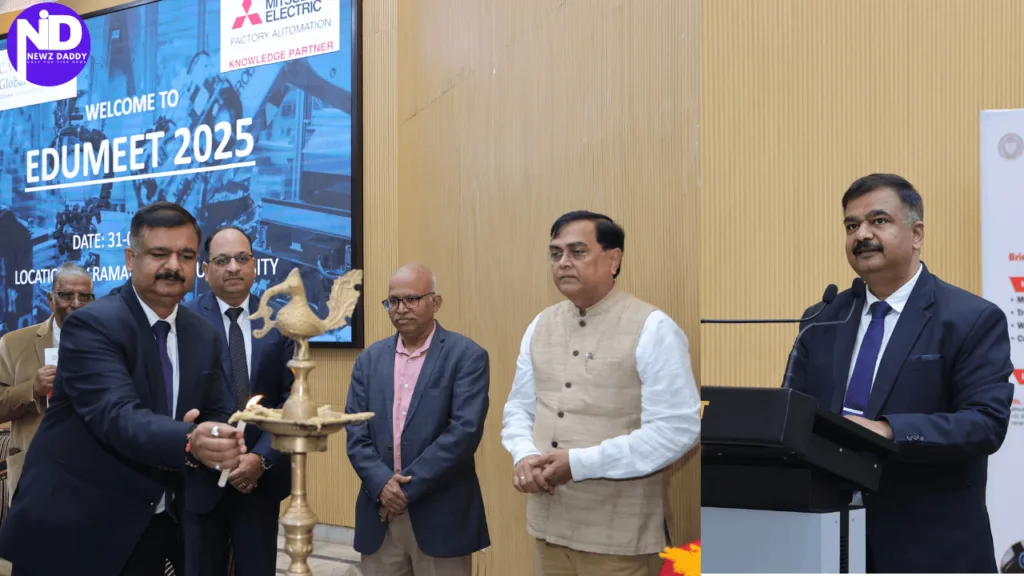Edu Meet 2025: Where Academia and Industry Join Hands for a Better Future
Newz Daddy Educational Updates
Synopsis of the Article in Bullet Points:
- Edu Meet 2025 was held on January 31, 2025, at C.V. Raman Global University, Bhubaneswar.
- Professor (Dr.) Kalpesh H. Wandra, Pro-Vice Chancellor of Rashtriya Raksha University, attended as the Chief Guest.
- The event was hosted by Professor Banshidhar Majhi, Vice-Chancellor of C.V. Raman Global University.
- Distinguished guests included:
- Mr. Sanjib Kumar Rout, Founder & President of C.V. Raman Global University
- Mr. Sunil Mehta, Head of CSD at Mitsubishi Electric India
- Professor N.S. Das, Director of the Industrial Automation Centre at C.V. Raman Global University
- Dr. Soumya Mishra, IQAC Coordinator at C.V. Raman Global University
- Key Discussion Themes:
- Industry-Academia Collaboration – Bridging the gap between theory and practical industry needs.
- Expectations from New Graduates – Key skills required for modern industries.
- Factory Automation Trends – Advancements in automation and their impact on industries and education.
- Professor Wandra’s Keynote Address:
- Stressed the importance of integrating education with industry for real-world problem-solving.
- Emphasized the need for AI, Machine Learning, robotics, and automation in modern education.
- Highlighted case studies like Siemens & RWTH Aachen University as successful models of collaboration.
- Suggested internships, R&D partnerships, faculty exchange programs, and startup ecosystems to strengthen the industry-academia bond.
- The event ended with a call to action, urging universities and industries to collaborate for innovation, research, and economic growth.
Education and industry cannot operate independently in the rapidly changing world of today. In light of this, on January 31, 2025, C.V. Raman Global University in Bhubaneswar sponsored Edu Meet 2025, which brought together academics, business executives, and legislators to talk about how to close the gap between theory and practical implementation.
The Chief Guest for the occasion was Professor (Dr.) Kalpesh H. Wandra, Pro-Vice Chancellor of Rashtriya Raksha University. Professor Banshidhar Majhi, Vice-Chancellor of C.V. Raman Global University, gave him a hearty welcome.
Several well-known panelists from business and academics participated in the talks, including:
Mr. Sanjib Kumar Rout, C.V. Raman Global University’s founder and president
Mr. Sunil Mehta, Mitsubishi Electric India’s Head of CSD
The director of C.V. Raman Global University’s Industrial Automation Centre, Professor N.S. Das
Dr. Soumya Mishra, C.V. Raman Global University’s IQAC Coordinator
The event’s main focus was on how crucial industry-academia cooperation is to forming the workforce of the future. Speakers emphasised how incorporating real-world industrial expertise into academic curricula might improve students’ readiness for obstacles they may face in the real world.
Key topics discussed included:
What Employers Look for in New Graduates: In today’s labor market, panellists emphasize the value of flexibility, technical know-how, problem-solving abilities, and soft skills.
Emerging Trends in Factory Automation: Artificial Intelligence, robots, digital twins, and edge computing were discussed, along with their growing significance in various industries.
The Significance of Industry-Academia Cooperation It was underlined how important research collaborations, apprenticeships, internships, and skill-based training programs are.
Professor Wandra gave a thought-provoking talk on how education needs to change in the twenty-first-century economy during his keynote presentation. He made the point that industry and academia have operated independently for far too long, but cooperation is now required in the fast-paced world of today.
Education needs to be more than just books. Students at universities should be able to apply their theoretical knowledge to practical issues. The way we educate is just as important to the future of education as the content we teach.
He emphasized the importance of technology in education, specifically in the areas of robotics, cybersecurity, machine learning, and artificial intelligence (AI). He also talked about how energy-efficient and sustainable manufacturing is becoming more and more important.
He gave a case study on Siemens and RWTH Aachen University to demonstrate effective industry-academia collaborations, wherein cooperative research was used to address practical industrial problems.
Professor Wandra recommended several doable actions to improve relationships between academic institutions and business, such as:
Creating curricula that incorporate industry
Offering student internships and apprenticeships Promoting collaborations in research and development
Introducing programs for faculty exchange and training
promoting entrepreneurial possibilities and startup ecosystems
A powerful message of cooperation emerged at the event’s conclusion. Participants were urged to actively look for new collaborations and endeavor to develop an educational system that satisfies the needs of contemporary businesses.
The future of industry-academia cooperation appears bright with initiatives like Edu Meet 2025, opening doors for economic growth, research, and innovation.
Must Read:
Rashtriya Raksha University Leads India’s Olympic Strategy
BCORE Leads India’s Olympic Future with Groundbreaking Research at RRU

